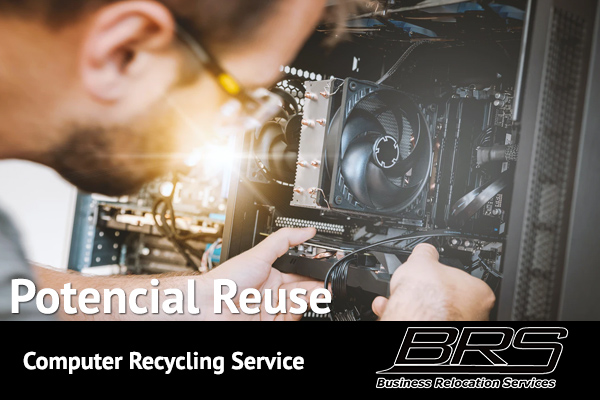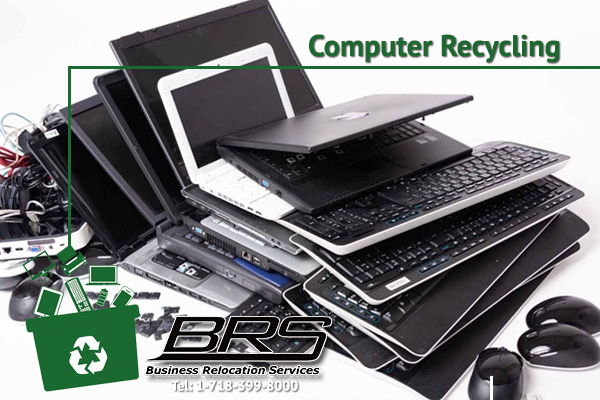Safeguard and Liable Computer Recycling for a Greener Future
Safeguard and Liable Computer Recycling for a Greener Future
Blog Article
Sustainable IT Solutions: Trustworthy Computer Recycling Solutions
In light of this, the requirement for credible computer system recycling services has actually never been even more vital. In this discussion, we will check out the ecological influence of e-waste, the advantages of responsible computer system recycling, how to select a credible recycling solution, the reusing process for computers and digital devices, and the duty of government policies in e-waste management.
The Ecological Influence of E-Waste
The incorrect disposal of electronic waste, generally known as e-waste, has considerable environmental ramifications. E-waste describes disposed of electronic gadgets such as smartphones, computer systems, and televisions (computer recycling). These gadgets include dangerous materials such as lead, mercury, cadmium, and brominated flame retardants, which can be dangerous to both human wellness and the environment otherwise appropriately managed
When e-waste is incorrectly thrown away, it usually winds up in garbage dumps or is incinerated, releasing toxic compounds right into the water, air, and soil. The release of these harmful materials can pollute groundwater, pollute the air, and add to dirt destruction, positioning serious health and wellness risks to nearby communities and ecological communities.
Furthermore, the incorrect disposal of e-waste additionally adds to the exhaustion of natural sources. computer recycling. Several electronic devices include useful steels like gold, silver, and copper that can be recovered and reused if appropriately reused. When e-waste is not recycled, these beneficial resources are lost, and the need for brand-new raw materials rises, leading to enhanced mining activities and more environmental degradation.
To reduce the ecological influence of e-waste, correct recycling and disposal techniques need to be used. This consists of the responsible collection, taking down, and recycling of electronic devices to recover valuable products and ensure the safe monitoring of dangerous substances. Carrying out reliable e-waste monitoring methods is critical to shield the setting, save resources, and promote a sustainable future.

Benefits of Accountable Computer System Recycling
Correctly reusing computers provides a wide variety of benefits, including environmental preservation and resource preservation. Responsible computer system reusing not only aids stop electronic waste from finishing up in land fills, yet it likewise lowers the demand for basic materials and power in the production of brand-new devices.
Among the most considerable benefits of liable computer recycling is the conservation of the setting. When electronic waste is incorrectly thrown away, it can launch hazardous compounds such as lead, mercury, and cadmium into the dirt and water, presenting a threat to ecological communities and human health. By reusing computers, these unsafe materials can be safely extracted and gotten rid of, minimizing the danger of air pollution.
One more benefit is source conservation. Computers have useful materials like gold, copper, silver, and light weight aluminum, which can be recouped and recycled through reusing procedures. By drawing out and reusing these materials, the need for mining brand-new sources is decreased, saving natural deposits and decreasing the ecological impact of source extraction.
Additionally, accountable computer system reusing aids to minimize energy consumption. Production new computers requires a substantial quantity of energy, from the removal of basic materials to the setting up process. By recycling computers and reusing their components, the energy-intensive manufacturing process can be avoided, causing a reduction in greenhouse gas exhausts and a more lasting use energy sources.
How to Choose a Trustworthy Computer Recycling Service
When picking a computer reusing solution, it is necessary to think about a couple of vital elements to make certain that you pick a trustworthy and dependable company. To start with, it is important to verify if the reusing service follows proper environmental guidelines and practices. A reputable company will certainly have accreditations and accreditations that show their dedication to responsible recycling. Seek accreditations such as R2 (Liable Recycling) or e-Stewards, which ensure that the reusing procedure satisfies strict requirements for environmental protection and data security. Second of all, inspect if the service offers safe data destruction. Information safety and security is a crucial problem when recycling computer systems, as delicate information kept on old tools can be susceptible to theft or misuse. A reliable recycling solution must have secure data devastation methods in place, such as data wiping or physical devastation of storage gadgets. Additionally, consider the solution's track record and track record. Look for evaluations or testimonials from previous clients to determine their level of customer contentment and reliability. Finally, take into consideration the service's openness and accountability. A trustworthy service provider must have the ability to give comprehensive information regarding their reusing procedure, including exactly how they manage unsafe materials and make certain proper disposal. By considering these elements, you can select a computer recycling solution that is ethical, dependable, and ecologically liable.
The Recycling Refine for Computer Systems and Electronic Tools
To ensure liable disposal and lessen ecological influence, comprehending the recycling process for computers and digital devices is important when picking a reliable recycling service. The reusing process for these gadgets generally entails a number of phases.
First of all, the devices are accumulated from individuals, services, or drop-off points. This collection procedure may include transportation logistics and secure managing to protect the delicate information included within the tools. When gathered, the devices are arranged based upon their type, such as laptops, smart devices, or desktop computers.
After sorting, the devices go through a comprehensive data damage process to make certain that any delicate or individual info is completely erased. This step is important to safeguard the privacy and protection of organizations and individuals. Data damage methods may consist of wiping, degaussing, or physical damage of the her explanation storage space media.
Following, the gadgets are dismantled into their individual components. This enables the separation of different materials, such as plastics, metals, and circuit card. These products are after that sent out to specialized reusing centers for further processing.
The recycling facilities make use of different methods to remove beneficial materials from the digital waste. These materials can be reused or repurposed in the production of new products. The remaining waste is taken care of in an environmentally accountable way, adhering to governing standards.
The Duty of Federal Government Rules in E-Waste Administration
Federal government laws play an essential role in the efficient monitoring of e-waste. With the continual development of the electronics sector and the raising problem for ecological sustainability, the requirement for correct disposal and recycling of digital waste has actually ended up being more web obvious. Federal government laws aid to make certain that e-waste is handled in a accountable and lasting way.
One of the main roles of federal government policies is to establish requirements and standards for e-waste management. These regulations specify the appropriate methods for collection, transport, and recycling of electronic waste. By establishing these criteria, governments can ensure that e-waste is dealt with in such a way that minimizes its effect on the environment and human wellness.
Government laws likewise play a crucial function in applying the appropriate disposal of digital waste. They need merchants and manufacturers to take duty for the products they sell and produce. This includes applying take-back programs, where producers are accountable for accumulating and recycling electronic waste from customers. These laws assist to change the burden of e-waste administration from the individual customer to the sector, guaranteeing that electronic waste is managed in an extra lasting fashion.

Final Thought
In verdict, it is important to take into consideration the environmental effect of e-waste and pick a trustworthy computer system reusing solution to sensibly dispose of electronic gadgets. By complying with government guidelines see page and participating in appropriate recycling processes, we can alleviate the unfavorable impacts of e-waste on the setting and advertise a more sustainable future.
In this discussion, we will certainly explore the environmental impact of e-waste, the benefits of liable computer system recycling, just how to select a credible recycling service, the recycling process for computers and digital tools, and the role of government policies in e-waste administration. Computers contain important materials like gold, copper, aluminum, and silver, which can be recovered and recycled with reusing procedures.Moreover, responsible computer system reusing helps to decrease power intake. Information safety is a vital concern when recycling computers, as sensitive information saved on old tools can be susceptible to theft or abuse. By thinking about these variables, you can choose a computer recycling service that is moral, trustworthy, and eco responsible.
Report this page